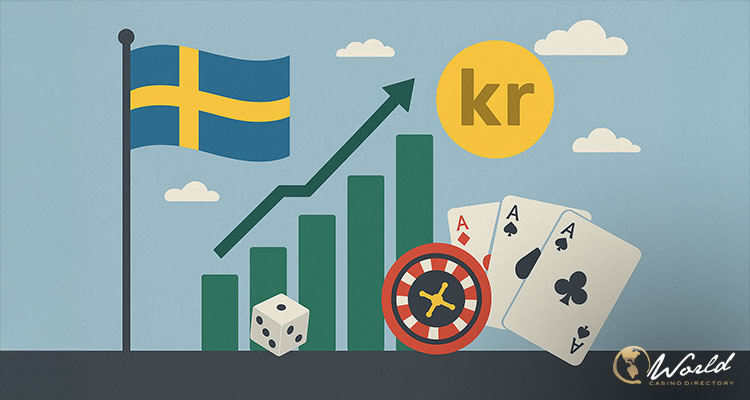Sweden’s regulated gambling industry recorded a narrow year-on-year rise in revenue during the third quarter, with licensed operators generating approximately SEK6.7bn to SEK6.71bn. The increase—0.5% across all three reported datasets—signals that digital gambling continued to strengthen, even as land-based activity and state lottery performance weakened. Despite this slight uplift compared to Q3 2024, the overall total remained 4.4% below the SEK7.02bn reported in the second quarter of this year.
Online Gambling Maintains Lead Despite Tough Comparisons
Across all reported figures, commercial online gambling again accounted for the largest contribution to national revenue. The online sector, covering both casino and online sports betting, generated SEK4.51bn during the quarter—an annual increase of 3.5%. This growth came despite the fact that Q3 of last year included major international sporting events such as Euro 2024 and the Paris 2024 Olympics, both typically strong drivers of betting activity.
Data from Spelinspektionen also suggested stable digital engagement within the licensed market. The Swedish Gambling Authority stated that “Gambling companies with a Swedish licence turned over SEK 6.7bn (€610 million) during the third quarter of 2025,” noting that this represented “an increase of 0.5 percent compared with the same quarter in 2024.” According to the authority, the sector appears to be holding steady even after Sweden’s 2024 tax increase from 18% to 22% and ongoing strict rules on bonuses, player incentives, and marketing.
Alongside revenue figures, regulators reported that “just over 130,000 people were suspended via Spelpaus.se, an increase of 2.1 percent from the previous quarter.” Rising self-exclusion numbers continue to shape policy discussions around gambling-related harm.
Land-Based Revenue Declines and Casino Cosmopol’s Exit Takes Effect
While online revenue increased, several land-based segments reported year-on-year decreases. Revenue from Svenska Spel’s state lottery and physical slot machines fell 7.2% to SEK1.26bn. Lotteries operating under “gaming for public benefit” saw a small 0.5% lift to SEK822m, and bingo revenue remained unchanged at SEK48m. Commercial land-based gaming—such as restaurant casino operations—generated SEK67m, marking a 3.1% improvement compared to last year.
However, the quarter marked Sweden’s first full period without any land-based casino revenue. Svenska Spel closed the last remaining Casino Cosmopol venue in April, following the government’s earlier vote to abolish land-based casinos. A full legal ban on physical casinos will take effect on 1 January 2026.
Spelinspektionen also announced supervisory inspections at Svenska Spel’s gaming halls, focusing on slot machine placements across its venues.
Svenska Spel reported net gaming revenue of SEK1.87bn for the quarter, a 7% increase compared to Q3 2024, driven primarily by strong results within Tur and Sport & Casino. These areas compensated for the decline in the Vegas machine segment and the discontinuation of Casino Cosmopol’s operations.
A major upcoming shift concerns the government’s decision to expand the ban on gambling with credit. Although current legislation already prohibits players from using credit directly with licensed operators, new regulations will broaden this significantly.
Starting 1 April 2026, both operators and gambling agents will be prohibited from handling any gambling transactions funded by credit—whether through bank overdrafts, loans, or external credit agreements. Measures such as blocking credit card payments and avoiding promotion of third-party lenders may be required. The government noted that exceptions may be granted by Spelinspektionen for operators conducting gambling for public benefit, including charity lotteries.


